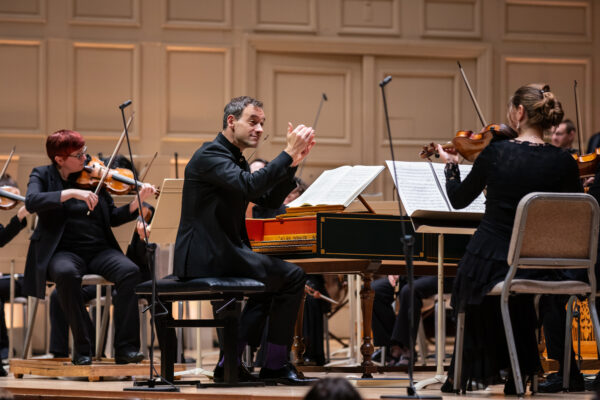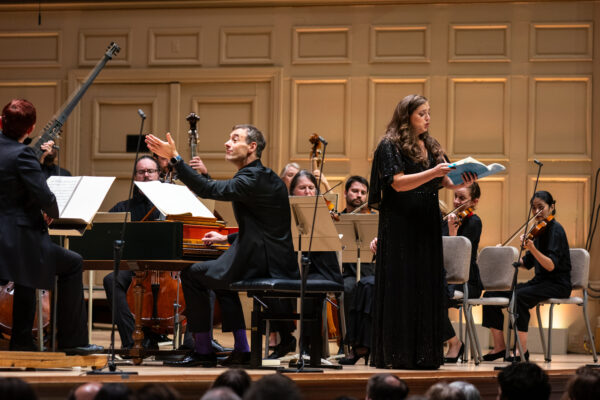Handel and Haydn Society’s Season Opener — A Fiery “Israel in Egypt”
By Aaron Keebaugh
The fury H&H’s new artistic director Jonathan Cohen delivered in this performance made Israel in Egypt and its timeless story ring with renewed vigor.

H&H’s new artistic director Jonathan Cohen conducts from the harpsichord. Photo: Robert Torres
New seasons routinely bring fresh faces. And in the case of the Handel and Haydn Society, the most recent change has come in its highest rank. Jonathan Cohen now occupies the position of H&H artistic director, a post he officially began last Friday night when he opened the season with George Frideric Handel’s Israel in Egypt.
It proved a solid choice for a new era, yet it is grounded in H&H tradition. The ensemble performed Israel in Egypt at the 1872 World Peace Jubilee and as part of a season-long celebration of the 200th anniversary of Handel’s birth in 1885. Since then, it has only been heard five times from H&H, most recently in 2011. For Cohen, the time was ripe for a revisit.
And the occasion of his ascendance to artistic director also brought into focus the work’s symbolic value. Franz Joseph Haydn, Cohen said in an interview last week, had most likely heard Israel in Egypt in London, which then served as a catalyst for Haydn to turn his attention toward oratorios — such as The Creation — in his final decade. Handel’s score, then, brings everything full-circle — connecting the two eponymous pillars of the period instrument organization that Cohen now leads.
But Israel in Egypt has a draw all its own. Theatrical to its sonic fingernails, the oratorio gives us Handel at his storytelling best, reveling in the Biblical material’s emotional up and downs with cinematic flair. The Israelites, by way of Charles Jennens’s swift-moving libretto, are mourning the death of Joseph and fall under the oppressive yoke of Egyptian rule. They escape into the wilderness with nothing but sheer faith.
Cohen opted for the lesser-known 1757 version of the oratorio, which injected more arias into its already expansive form. Even via this approach, the oratorio remains a chorus-lover’s dream. Lines sizzle with a live-wire energy that taps into the responses to the horrors of the biblical narrative — from swarms of flies and locusts to the deaths of the Egyptian first-born. Other passages, involving little more than four-part harmony, convey a warm solace. The oratorio feels like a slam-bang fundamentalist sermon: vivid, fiery, passionate, yet rooted in lived experience.
In Friday’s performance, the H&H chorus was in top form: diction was as clear as spring water; sudden crescendos injected vitality.
Cohen approached the score from the perspective of a chamber musician. Sharing duties with Ian Watson on back-to-back harpsichords, he built the musical experience from the bottom up. Even in choral passages, his conducting zeroed in on the tactile pulse as well as the flowing line. This was a Handel whose volatility erupted on all vocal sides.

Artistic director Jonathan Cohen conducts with soprano Teresa Wakim in the spotlight. Photo: Robert Torres
The production also conveyed the full range of darkness to light. “They loathed to drink of the river” carried palpable dramatic weight. “He gave them hailstones for rain” surged and thundered like the storm described in the text. All the forces crashed violently in “He rebuked the Red Sea,” the fateful chronicle of the death of the Egyptian military leaders while they were in hot pursuit of the Israelites.
“The Lord hath given strength to his people” from Part 1 glowed with prayerful assurance. “The Lord shall reign for ever and ever” resounded in valedictory triumph. Through it all, Cohen maintained seismic power.
Soloists drawn from H&H’s ranks only reinforced the composition’s quasi-operatic dimensions. As the high priest, tenor Stephen Soph sang with the appropriately fiery conviction of a country preacher. As Joseph, soprano Teresa Wakim vocalized with warmth and resonance, capturing both the pain of loss and the eventual release through faith.
Jonas Budris brought a percussive, Shakespearean diction to his recitatives in Part 2 that warned about the Egyptians ruling with an iron fist. Countertenor Douglas Dodson’s melismas in “Their land brought forth frogs” dazzled to the point of elation, evincing a whoop from the audience.
Sonja Dutoit Tengblad’s dark soprano engendered sympathy and pathos in “Toss’d from thought to thought I rove.” Tenor Steven Wilson and soprano Sarah Yanovitch Vitale were just as superb, infusing their respective arias with both biting vengeance and smooth tranquility. Basses Ryne Cherry and Craig Juricka complemented each other in “The Lord is a man of war.”
The orchestra generated live-wire pizzazz with every bar. Rhythms snapped and crackled through the air as Cohen, Watson, and cellist Guy Fishman anchored the sonic mass with a sturdy continuo.
The sturdy resplendence of Handel lies in how he cultivated such dramatic contrasts. But the fury Cohen delivered in this performance made Israel in Egypt and its timeless story ring with renewed vigor. Rather than a desperate grasp for salvation, this staging was about hope as a bold and continuous act of overcoming oppression.
Aaron Keebaugh has been a classical music critic in Boston since 2012. His work has been featured in the Musical Times, Corymbus, Boston Classical Review, Early Music America, and BBC Radio 3. A musicologist, he teaches at North Shore Community College in both Danvers and Lynn.
Tagged: Handel and Haydn Society, Israel in Egypt


Surprising soloist Woodrow Bynum was not mentioned in this review. I thought he was the best of all the soloists.